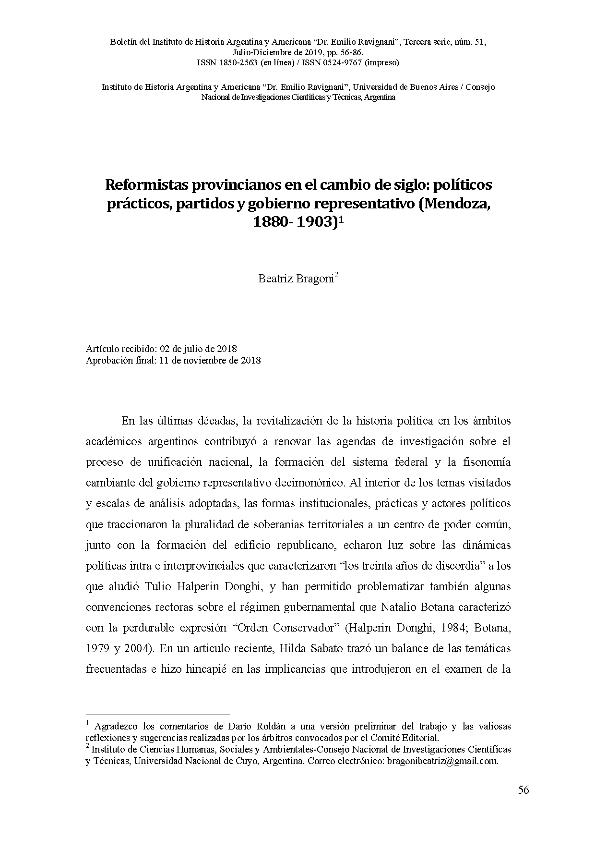Artículo
En sintonía con la historiografía política reciente que ha revisado aspectos clave del régimen político argentino entre 1880 y 1916, el artículo aborda dos trayectorias políticas de políticos provinciales con el propósito de problematizar la definición compacta de gobierno elector, e interpretar el papel de la oposición y la rivalidad partidaria en la reforma del gobierno representativo de la provincia de Mendoza a fines del siglo XIX. En particular, analiza el papel de la sociabilidad escolar y de la movilidad extraterritorial en la formación de las dirigencias locales, las relaciones cultivadas en las aulas universitarias en los trayectos políticos posteriores a su egreso, los canales de acceso a la actividad política y a la función pública, el creciente protagonismo de los partidos políticos, y las formas de interpretar e intervenir en la atmósfera reformista que trastocó los cimientos del régimen político provincial y nacional en el cambio de siglo. Los resultados de la pesquisa ponen de relieve aspectos poco advertidos por la historiografía clásica entre los que se destaca la relativa permeabilidad de las elites decimonónicas, y las iniciativas reformistas provinciales diseñadas para dotar de estabilidad y legitimidad el régimen político en vísperas de la reforma electoral nacional de 1912. The purpose of this article is to problematize the definition of “elector government”, and to interpret the role of the opposition and party rivalry during the reform of the representative government of the province of Mendoza at the end of the 19th century. In order to do that, two political trajectories of provincial politicians are taken into consideration in the same way that the recent political historiography has outlined key aspects of the Argentine political regime between 1880 and 1916. In particular, the article analyzes the role of school sociability and extraterritorial mobility in the formation of local leaderships, the relationships cultivated in the university classrooms during the political journeys after graduation, the different access to political activity and public offices, the growing role of political parties, and the ways of interpreting and intervening in the reformist atmosphere that upset the foundations of the provincial and national political regime at the turn of the century. The results of the research emphasize certain aspects that were not noticed at all by classical historiography, such as the relative permeability of the elites in the 19th century, and the provincial reform initiatives designed to provide stability and legitimacy to the political regime on the eve of the national electoral reform of 1912.
Reformistas provincianos en el cambio de siglo: políticos prácticos, partidos y gobierno representativo (Mendoza, 1880- 1903)
Título:
Provincial Reformists at the Turn of the Century: Practical Politicians, Parties, and Representative Government (Mendoza, 1880-1903)
Fecha de publicación:
09/07/2019
Editorial:
Universidad de Buenos Aires. Facultad de Filosofía y Letras. Instituto de Historia Argentina y Americana “Dr. Emilio Ravignani”
Revista:
Boletín del Instituto de Historia Argentina y Americana “Dr. Emilio Ravignani”
ISSN:
0524-9767
e-ISSN:
1850-2563
Idioma:
Español
Tipo de recurso:
Artículo publicado
Clasificación temática:
Resumen
Palabras clave:
DIRIGENCIAS
,
REGIMEN REPRESENTATIVO
,
MENDOZA (ARGENTINA)
,
SIGLO XIX
Archivos asociados
Licencia
Identificadores
Colecciones
Articulos(INCIHUSA)
Articulos de INST. DE CS. HUMANAS, SOC. Y AMBIENTALES
Articulos de INST. DE CS. HUMANAS, SOC. Y AMBIENTALES
Citación
Bragoni, Elsa Beatriz; Reformistas provincianos en el cambio de siglo: políticos prácticos, partidos y gobierno representativo (Mendoza, 1880- 1903); Universidad de Buenos Aires. Facultad de Filosofía y Letras. Instituto de Historia Argentina y Americana “Dr. Emilio Ravignani”; Boletín del Instituto de Historia Argentina y Americana “Dr. Emilio Ravignani”; 51; 9-7-2019; 56-86
Compartir




